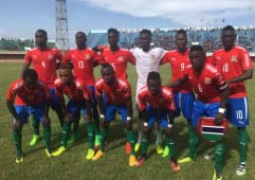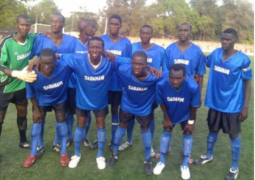The communities supported by the EU-funded MDG1c Project in the North Bank Region to fight hunger and poverty through maize and millet production, say the intervention had greatly enhanced their livelihoods.
The 7.6million Euros project is aimed at improving food security through crop production intensification and the School Feeding Programme.
The crop production intensification component of the project worth 5.5million Euros is being implemented by the Food and Agriculture Organization of the United Nations (FAO) in partnership with the department of agriculture.
Alagie Ousman Secka, Mrs Awa Njie and Ida Jallow all of Medina Daru in Lower Niumi recent told journalists and the FAO Communications Officer, Amadou Bah, during a tour of the project`s supporting communities that the intervention had helped increase their produce and income.
They have restated their commitment to sustain the revolving loan schemes set up through the project grants for improved income and well-being.
Mr Secka stated that this year, he harvested 25 (80kg) bags of maize thanks to the fertilizers and seeds provided by the project to the community in the form of a grant.
Alagie Ousman Secka
Mrs Sainabou Sowe, Secretary to the Women’s Group at Chilla village in Upper Niumi district also informed journalists that thanks to the assistance given to them by the project, the group has in its bank account over D180, 000.
She stated that the amount would increase to over D200,000 once the fertilizer loans issued to member this year are repaid.
Commenting of the impact of the project on individual members of the group and their households in the community, Mrs Sowe indicated that her household of seven are still consuming their 2014 produce.
Mrs Sainabou Sowe
She announced that many others in the community also had a good harvest in 2014.
However, she noted that the 2015 produce was less due to the heavy downpour of rains, which affected the performance of the maize crop.
Demba Jallow, Amie Jallow, Ansata Jawo and Alieu Bah all of Kerr Katim Fulbeh village in Central Baddibou District made similar remarks.
They noted that the project had helped increase income as well as reduce hunger in the community.
Demba Jallow explained that the community realized its record produce in over 300 years of existence, in 2014, thanks to the farm inputs and technical supported provided by the MDG1c project.
Demba Jallow
He said that the 2014 produce lasted for 9-12 months with many households in the community, noting that prior to the intervention, most households exhausted their produce within six months.
He said the Producers’ Group set up by the project in the community now has over D200,000 which will be used to sustain the fertilizer scheme.
Ndey Ngalaan, president of the Njawara Food Processing Centre Ndemballenteh Society in Lower Baddibou District, also said the maize package provided by the project is alleviating hunger and poverty in the community.
The produce from their producers’ group farm is being processed at the centre for improved incomes and food security.
The centre also buys maize from members and the entire community, and thus addressing their marketing constraints, as well as encouraging the production of maize for food security and well-being.
Ndey Ngalaan
Alagie Madi Ceesay, Aji Amie Touray and Fatou Gaye, all of Makka Farafenni village in the Upper Baddibou District, reported an increase in incomes and food security in the community thanks to the project.
They said yields declined in 2015 due to the heavy rains, but most households in the community consumed their 2014 produce for 9-12 months.
They said prior to the intervention, families were struggling to survive. They said the assistance has also encouraged the diversification of diets in the community for improved nutrition..
Aji Amie Touray
Naimbelly Jallow, Penda Bah and Kumba Jallow, all of Duta Bulu village in the Upper Baddibou District, praised the project for bringing about increased food and incomes in the community.
Mrs Jallow said the group has over D100,000 in their bank account.
She also lauded the project for building their capacity in best farming practices, governance, group management and entrepreneurship.
She singled out the lack of threshing machines as a huge problem leading to serious post-harvest losses, as people rely on threshers from neighbouring Senegal which normally come late.
Mrs Kumba Jallow, President Dutabulu Women Group
Mrs Jallow also said that the provision of threshers will help reduce drudgery on women, and thus enable them have more time to engage in other income-generating activities such as gardening.



